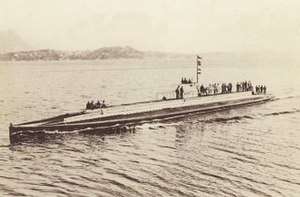French submarine Armide
Armide was a submarine ordered by the Japanese Navy from the Schneider-Creusot shipyard before World War I but was requisitioned by the French government before it was launched. Armide operated in the Mediterranean during the course of World War I and was stricken from the Navy list in July 1932.
 Armide (1922 or 23) | |
| History | |
|---|---|
| Name: | No. 14 |
| Builder: | Schneider-Creusot shipyards, France |
| Laid down: | 1912 |
| Fate: | Requisitioned by the French Navy, 3 June 1915 |
| Name: | Armide |
| Launched: | July 1915 |
| Completed: | June 1916 |
| Fate: | Stricken and sold for scrap in July 1932. |
| General characteristics | |
| Type: | Submarine |
| Displacement: | |
| Length: | 56.2 m (184 ft 5 in) |
| Beam: | 5.2 m (17 ft 1 in) |
| Draught: | 3 m (9 ft 10 in) |
| Propulsion: |
|
| Speed: |
|
| Range: |
|
| Complement: | 31 |
| Armament: |
|
Design
Armide had a surfaced displacement of 457 long tons (464 t) and a submerged displacement of 670 long tons (681 t). Her dimensions were 56.2 m (184 ft 5 in) long, with a beam of 5.2 m (17 ft 1 in) and a draught of 3 m (9 ft 10 in). Propulsion while surfaced was provided by two diesel motors built by the Swiss manufacturer Schneider-Carels producing in total 2,200 bhp (1,641 kW) and for submerged running two electric motors producing in total 900 hp (671 kW). Her maximum speed was 17.5 knots (32.4 km/h; 20.1 mph) on the surface and 11 knots (20 km/h; 13 mph) while submerged with a surfaced range of 2,600 nautical miles (4,800 km) at 11 knots (20 km/h) and a submerged range of 160 nautical miles (300 km) at 5 knots (9.3 km/h).[1][2][3]
Armide was armed with six 450 mm (17.7 in) torpedo tubes and a 47 mm (1.9 in) L/50 M1902 Hotchkiss deck gun.[2] The crew of the submarine consisted of 31 officers and seamen.[1][3]
Service
.jpg)
Armide was ordered in 1911 by the Imperial Japanese Navy and was designed by Maxime Laubeuf.[2][3] The ship was to receive the number 14 in Japan (第 14 号艦) but it was requisitioned by the French government on 3 June 1915,[3] after which the Japanese themselves built a replacement No 14 to the same design, ordering the diesel engines from France.[5]
The Armide was built in the Schneider shipyard in Chalon-sur-Saone, France. The keel was laid down in 1912,[2][6] it was launched in July 1915,[2][7] and was completed in June 1916.[7]
Armide operated in the Mediterranean during the course of World War I and was stricken from the Navy list in July 1932.[7] Armide was given the pennant number of SD 2.[2]
References
- Couhat, p. 160
- Gardiner, p. 212
- Fontenoy, p. 86
- Gardiner, p. 247
- Jane, p. 198
- Couhat, p. 162
Citations
- Couhat, Jean Labayle (1974). French Warships of World War I. London: Ian Allan. ISBN 0-7110-0445-5.
- Gardiner, Robert; Gray, Randal (1985). Conway's All the World's Fighting Ships, 1906–1921. London: Conway Maritime Press. ISBN 978-0-85177-245-5.
- Fontenoy, Paul E. (2007). Submarines: An Illustrated History of Their Impact. ABC-CLIO Publishing. ISBN 978-1-85109-563-6.
- John Moore (1990). Jane's Fighting Ships of World War I. London.
- Perepeczko, Andrzej (2014). Od Napoleona do de Gaulle’a. Flota francuska w latach 1789–1942. Oświęcim. ISBN 978-83-7889-372-1.
- Lipiński, Jerzy (1999). Druga wojna światowa na morzu. Warsaw. ISBN 83-902554-7-2.
- J. Gozdawa-Gołębiowski; T. Wywerka Prekurat (1994). Pierwsza wojna światowa na morzu. Warszawa.